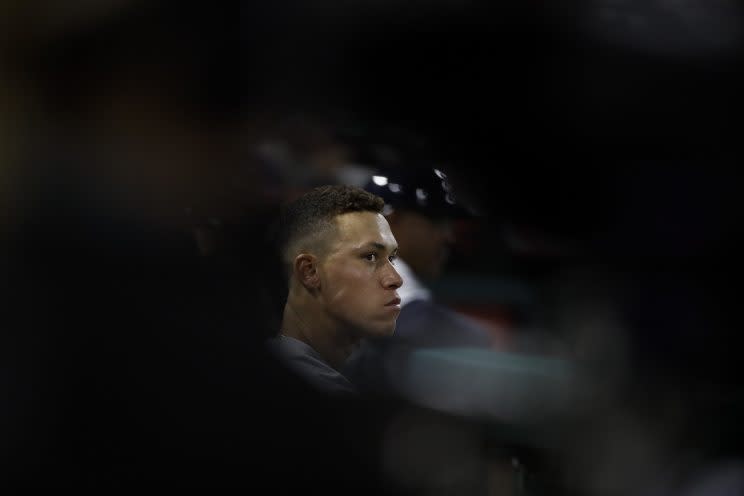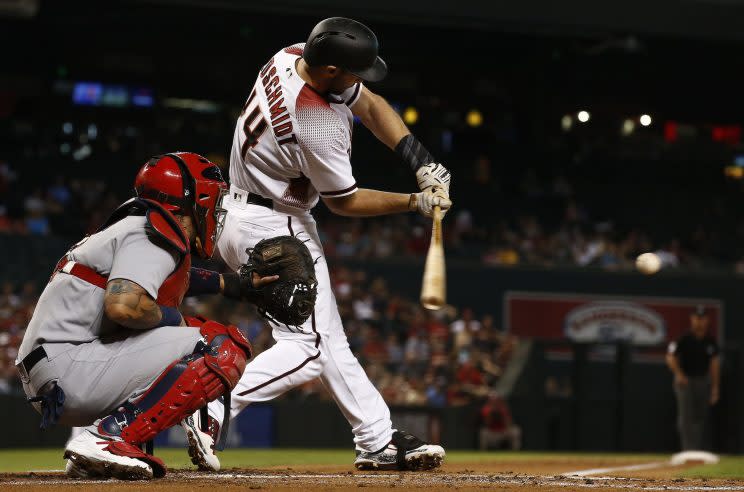MLB First-Half Awards: Aaron Judge, Aaron Judge and, oh yeah, Craig Stammen?

The math in baseball is all goofy. The “first half” of this season for most teams will end somewhere around the 87-game mark. Half of 162 is not 87. So for the sake of accuracy – and pedantry – as the weekend of most teams’ 81-game mark dawns, Yahoo Sports presents the Real First-Half Awards for 2017.
American League MVP
1. Aaron Judge
2. Chris Sale
3. Mike Trout
4. George Springer
5. Jose Altuve
6. Jose Ramirez
7. Carlos Correa
8. Miguel Sano
9. Corey Dickerson
10. Yonder Alonso
This is not particularly close. Judge has been the best player in baseball this season. He leads the AL in both the sabermetric Triple Crown (.331/.451/.699) and the traditional one (.331, 27 home runs, 62 RBIs). Trout was so good before his wrist injury that he still deserves a top-3 spot. It’s a shame Springer, Altuve and Correa are as brilliant as they are. Unless one separates himself, come actual voting time, they’re likely to siphon votes from one another.
National League MVP
1. Paul Goldschmidt
2. Max Scherzer
3. Justin Turner
4. Bryce Harper
5. Joey Votto
6. Buster Posey
7. Corey Seager
8. Anthony Rendon
9. Cody Bellinger
10. Daniel Murphy

As with just about everything he does, Goldschmidt is turning in a kid-on-an-iPad quiet MVP-type season. He is the most well-rounded first baseman we’ve seen in some time, among his ability to hit for average and power, his patience, his baserunning and his glove. Scherzer has been the best pitcher in baseball this year, and like Sale, his dominance deserves MVP consideration. The rest of the list is pretty much Dodgers and Nationals, with Joey Votto and Buster Posey sprinkled within because they’re intent on adding more bona fides to their Hall of Fame résumés.
American League Cy Young
1. Chris Sale
2. Jason Vargas
3. Dallas Keuchel
4. Lance McCullers
5. Yu Darvish
Sale is well on his way to becoming the first AL pitcher to strike out 300 since Pedro Martinez in 1998. As much as it’s a reflection on the diminished innings totals for starting pitchers these days, it’s still surprising, amid the 25 percent spike in strikeouts over the last two decades, that the only pitcher since 2002 with 300-plus punchouts was Clayton Kershaw, who K’d 301 in 2015. Worth watching: Sale’s career ERA after the All-Star break is more than half a run higher than before – but his strikeout rate actually is higher.
National League Cy Young
1. Max Scherzer
2. Clayton Kershaw
3. Alex Wood
4. Robbie Ray
5. Carlos Martinez
Even if his next four seasons are average, it’s still going to be difficult to argue Max Scherzer’s $210 million contract with the Washington Nationals was anything but a rousing success. Scherzer is at the apex of his powers this season and is forging an odd-but-realistic trajectory toward the Hall of Fame. His last six seasons have been that good. For now, the rest of the NL is playing for second, though that Kershaw guy might have something to say about that.
American League Rookie of the Year
1. Aaron Judge
2. Trey Mancini
3. Ben Gamel
Next.
National League Rookie of the Year
1. Cody Bellinger
2. Josh Bell
3. Manny Pina
Bellinger’s ninth-place finish in the MVP voting above may be a little light. Teammates Justin Turner (who has been a better hitter by a fair margin) and Corey Seager (who’s hitting .294/.397/.498 and playing an excellent shortstop) simply have better cases. Bellinger need not worry about the Rookie of the Year voting. This one has unanimity written all over it.
Manager of the Year
This award is difficult enough to vote on in September. And the voting criteria is, more or less, choose which manager shepherded the most surprising team compared to what the preseason expectations were. Which is silly because the preseason expectations almost assuredly were flawed in the first place.
These are my awards and I can do with them what I please. Consider this abstention a protest vote.
Best Defensive Play
For all of Kevin Pillar’s brilliance and Manny Machado’s delight and Nolan Arenado’s otherworldliness, no play brought me as much joy as Craig Stammen’s behind-the-back grab and throw home. I understand the luck involved here pales next to tangible skill: Pillar’s ability to chase down a ball or Machado’s arm or Arenado’s lateral quickness. I also do not care. Craig Stammen is a middling relief pitcher who caught a ground ball blind and turned around and followed it with a laughably awkward throw home. You take your incredible feats of athleticism. I’ll have Craig Stammen pirouetting any day.
Worst Defensive Play
Note to all dads: Put down the baby, dimwit.
Idiot Mets fan catches foul ball at Dodger Stadium, nearly drops baby, wife ready to kill him. Video from @SNYtv pic.twitter.com/zBh5Dki4yD
— Keith Olbermann (@KeithOlbermann) June 23, 2017
Worst Pre-Season Pick: Jeff Passan, Kyle Schwarber for NL MVP
Yeah, but I totally nailed that Robbie Ray breakout.
Best Under-The-Radar First-Half Subplot: The Vengeance of the Mendoza Line
It’s not just Schwarber. A half-dozen players who are qualified for the batting title are hitting under .200. That’s the same total as the last 35 years combined. And the thing is, most of those there may keep playing. Schwarber is in the minors, and Mike Napoli and Jose Reyes could hemorrhage at-bats, but Joey Gallo, Alex Gordon and Byron Buxton are unlikely to lose their jobs.
Team Likeliest Not To Repeat Its First Half, Choke Edition: Colorado Rockies
Yes, this is easy to say about a team in the midst of an eight-game losing streak, but there are other indicators. Beyond Arenado, Charlie Blackmon and Mark Reynolds, the Rockies really haven’t hit much. More important than that is the likelihood of their rotation breaking down toward the end of the season. The rotation is dotted with rookie pitchers, none of whom have lived the grind of pitching a full season, let alone a full season in Colorado, which late in the year feels like throwing with a weighted vest on your back.
Team Likeliest Not To Repeat Its First Half, Surge Edition: Chicago Cubs
They aren’t hitting like they did last year. They aren’t fielding like they did last year. They aren’t pitching like they did last year. Their run differential shows no signs that they’re poised for a breakout. So, uh, why are they going to surge? Because they’re too talented not to. How about that for cutting-edge analysis?


